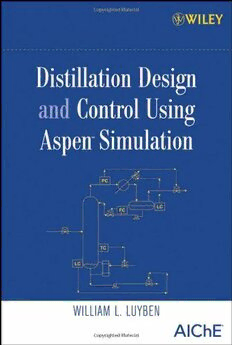
Distillation Design and Control Using Aspen Simulation PDF
355 Pages·2006·103.436 MB·English
Most books are stored in the elastic cloud where traffic is expensive. For this reason, we have a limit on daily download.
Preview Distillation Design and Control Using Aspen Simulation
Description:
A timely treatment of distillationcombining steady-state designand dynamic controllabilityAs the world continues to seek new sources of energy, the distillation process remains one of the most important separation methods in the chemical, petroleum, and energy industries. And as new renewable sources of energy and chemical feedstocks become more universally utilized, the issues of distillation design and control will remain vital to a future sustainable lifestyle.Distillation Design and Control Using Aspen Simulation introduces the current status and future implications of this vital technology from the dual perspectives of steady-state design and dynamics. Where traditional design texts have focused mainly on the steady-state economic aspects of distillation design, William Luyben also addresses such issues as dynamic performance in the face of disturbances.Utilizing the commercial simulators Aspen Plus and Aspen Dynamics, the text guides future and practicing chemical engineers first in the development of optimal steady-state designs of distillation systems, and then in the development of effective control structures.Unique features of the text include:* In-depth coverage of the dynamics of column design to help develop effective control structures for distillation columns* Development of rigorous simulations of single distillation columns and sequences of columns* Coverage of design and control of petroleum fractionatorsEncompassing nearly four decades of research and practical developments in this dynamic field, the text represents an important reference for both students and experienced engineers faced with distillation problems.
See more
The list of books you might like
Most books are stored in the elastic cloud where traffic is expensive. For this reason, we have a limit on daily download.
